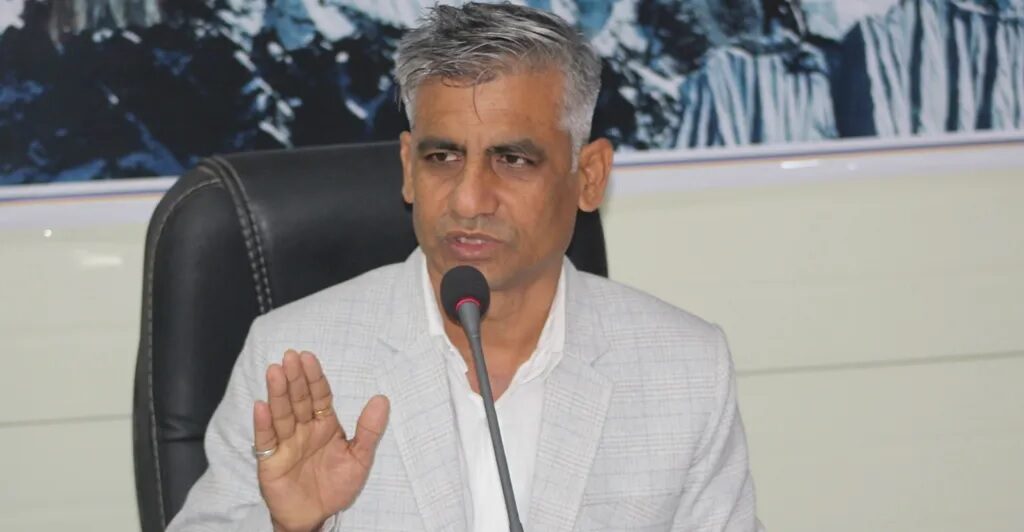KATHMANDU: Former Chief Minister of Koshi Province, Kedar Karki, is an elected provincial assembly member from the Nepali Congress. He is regarded as a staunch supporter of Dr. Shekhar Koirala.
Karki first gained attention by referring to himself as a “backbencher student” during his time as Chief Minister.
Recently, he has made headlines again by publicly criticizing NC General Secretary Gagan Thapa.
At a recent gathering of municipal chairpersons in Biratnagar, organized by the Shekhar-led faction of the Nepali Congress, leader Karki made a pointed remark, indirectly addressing General Secretary Gagan Thapa.
He suggested that those wishing to understand the NC statute should read it carefully, adding, “If you don’t know how to solve math, I will send you a calculator along with the statute.”
What prompted former Chief Minister Karki to make this remark towards General Secretary Thapa? What is the current relationship between Shekhar Koirala and Gagan Thapa?
And what might happen if Gagan Thapa decides to run against Shekhar for the party presidency at the upcoming general convention?
Additionally, why did Shekhar Koirala decide to boycott the Koshi Province conference in Biratnagar, organized by the establishment faction? Why has he not publicly supported or defended the coalition government led by KP Sharma Oli?
Gagan doesn’t belong to any specific faction. He tends to push anyone he aligns with off a cliff once he’s done with them, and this tendency is becoming evident once again.
Here is a brief conversation between Khabarhub and Karki, a Nepali Congress provincial MP, to address these pressing questions:
You are recognized as a leader of the Shekhar faction within the Nepali Congress. Why did you join this faction?
We are not just part of the Shekhar faction; we joined the Nepali Congress after studying, listening to, and understanding the history of Krishna Prasad Koirala.
That’s why we don’t view the divisions between factions or leaders as significant. BP Koirala himself was a rebel within the Nepali Congress, and the party itself is synonymous with rebellion.
If a person, having given up the lure of power, is willing to go to jail, and has studied BP Koirala’s history, speaks the truth—whether within the party or elsewhere—does it matter if they are called a rebel or a supporter?
I am ready to accept it. Nepali Congress is, at its core, a party of rebellion.
The recent NC gathering in Biratnagar was criticized by leaders of the establishment faction as being against the party statute. Do you agree with this?
Which party is being accused of this? Is it written anywhere in the statute that the president of the metropolis, municipal presidents, or rural municipality presidents must belong to the Sher Bahadur Deuba side, the Shekhar side, the Gagan side, the Arjun Narsingh side, or the Purna Bahadur Khadka side?
If not, can a municipality not organize a program, invite everyone, or not? Why should the party president and general secretary attend programs organized by other municipalities?
Leaders often rush to attend various programs, even competing for the opportunity.
The general secretary himself attended the district treasurers’ conference last time, even inviting the chief guest.
They also held a meeting with the district presidents. But where is it written in the statute that there should be a district president’s meeting?
So, can’t the municipal presidents gather, discuss the statute, and form a collective opinion?
Nepali Congress is the party that opposed the Panchayat constitution and resisted the king’s takeover.
Was it necessary to hold this gathering just two days before the provincial conference?
This gathering was organized by the city and municipality presidents, bringing together representatives from all municipalities.
They also conducted training and education. We wanted to understand the rights, duties, and powers of our presidents.
When will the center organize such an event? The province hasn’t done it either.
So, the 17 municipality presidents from Morang decided to organize it themselves. They invited municipal presidents from across the province, aiming to meet and exchange ideas.
Is it wrong for the Solukhumbu and Biratnagar municipality presidents to meet? In which statute did our elders walk around carrying bombs?
Were they allowed to do that? Consider Nanu Koirala, who came from Kolkata with weapons strapped to her body, with only her head exposed.
What did that show? The party had decided to send her armed and marching. This is the democracy that emerged from such struggles.
Ram and Laxman were killed in Timurebote—was their death caused by the statute of these leaders? Did they send them to die?
In strengthening the party, we have organized a program where the municipal presidents will hold conventions in time, and the party president will work toward that.
If this happens, we will defeat our competitors. This was a program we prepared before the provincial conference, but the provincial committee didn’t specify it.
This provincial committee is younger than the municipal meeting, as it’s been three years since the last conference.
It seems this will be both the first and the last, given that the party center’s convention is coming up.
Therefore, it’s illogical to say this is against the statute. We have asked them to work according to the statute.
Questions have also been raised within the Nepali Congress Central Working Committee regarding this gathering. Wasn’t there a directive issued to avoid such gatherings?
The top leaders are afraid of the lower organizations becoming active. If the lower organizations become active, the leaders who have been in power feel threatened.
That’s why those who are afraid will raise objections. Even Girija Babu once opposed the re-establishment of parliament. That’s the reality.
When you spoke at the Biratnagar gathering, you mentioned sending a calculator to the “viral leaders” of Congress to help them read the statute and do the math. Who were you referring to specifically?
Many have said that the central party president acted against the party’s statute and failed to follow it.
We have won as party office bearers and will work according to the statute. The office bearers who won should have read the statute more carefully.
For example, where in the statute does it say the Nepali Sangh will have 700 members? Where does it mention that the Tarun Dal will have 400 members?
How many months are allowed for these departments to form, or for a treasurer to be appointed?
This is something that should have been understood by reading the statute. The statute isn’t something you just recite; you must understand it.
It’s not enough to simply say “Jai Nepal” and “Namaskar.” The statute needs to be understood deeply. It’s not enough to greet people with “Jai Nepal” in the morning and at night.
People should reflect on what I said. This message is for those who have caused harm—they should understand.
Shekhar Koirala was seen supporting the idea of a Congress-UML merger after the 2079 BS elections, and you, too, became the Chief Minister with UML support in Koshi. Do you now support the Congress-UML merger at the national level?
We are not solely focused on the Congress-UML coalition. If the Congress-UML alliance had failed to deliver results, it would have been a mistake.
The government’s performance was lacking, and that could have led to the party’s decline.
However, the Congress did not follow that path. Our primary goal is to ensure that the Congress does not fade away.
Now that the government has been formed, we find ourselves in a position where we can barely come together.
We can’t oppose UML’s views either. When UML held a program at Durbar Marg yesterday, all the leaders attended.
Those who claimed to know about Congress are now admitting their lack of understanding.
I may be a “last bencher,” but I am well-educated and continue to study. As Abdul Kalam said, “When the first bencher starts thinking, the last bencher also begins.”
Therefore, those who sit in the front but cheat to pass should not be called “last benchers.” If you don’t study, you won’t understand the deeper truths.
Whatever the teacher taught, you must learn and understand. We may not have run the party according to the statute, but we should have.
Someone should have advocated for us to follow the statute, and that is why I raised my voice.
Now, we must ensure that the government operates according to the agreement made when the two parties united.
Shekhar Koirala’s statement doesn’t seem to support the current government, whereas General Secretary Gagan Thapa appears to have extended his support. Why do you think this is the case?
It seems some are acting out of personal interests. In the previous government, there were people who jumped into parliament, and it appears they want the government to continue, even if it does not perform well.
They seem to prefer ignoring the government’s shortcomings. This trend has taken root.
However, Shekhar Koirala is opposed to this. If the government fails to perform, it becomes a complex issue.
Should we support it even when it falters? The government was formed with the promise of constitutional amendments, good governance, and working for the people’s welfare.
When we saw shortcomings in all these areas, we couldn’t stay silent. We must remain vigilant in every aspect of governance.
Bad practices should be eliminated, and the government should be reformed, not blindly supported.
Did Shekhar Koirala boycott the Biratnagar provincial gathering organized by the establishment faction?
Rather than a formal boycott, Shekhar Koirala felt insulted, which led to his dissatisfaction. It was not a formal boycott of the conference, but a reaction to the disrespect he faced.
If it had been a real boycott, we wouldn’t have attended either. We attended because we didn’t want to miss the opportunity to be part of the discussion.
What happened that led to this insult?
They scheduled the program in Biratnagar without consulting us. On the morning of the municipal chairmen’s program on the 18th, they came to his house and told us not to attend their event.
It felt like they were simply going through the motions, saying, “You should come to our program.”
Provincial chairpersons also attended, but it seemed they were trying to mock Shekhar Koirala. It appeared to be a deliberate attempt to provoke him.
It felt as though they went to Kathmandu to write a letter to stop the program and then came back with the letter just to tease us.
Forming alliances for personal gain and then going against those you were once aligned with is not right. It’s not appropriate to comment on him too much, but that’s the reality.
It’s customary to give priority to the person who lost the presidency in the party, but that hasn’t happened yet. Who will receive that priority? That should have been made clear.
Why did General Secretary Gagan Thapa oppose Shekhar Koirala at the provincial meeting? Aren’t they from the same faction?
Gagan doesn’t belong to any specific faction. He tends to push anyone he aligns with off a cliff once he’s done with them, and this tendency is becoming evident once again.
He did the same during Girija Prasad Koirala’s time. Gagan became the General Secretary of the Nepali Congress during Guru Ghimire’s tenure but later campaigned for Ghimire’s removal.
He was also part of the faction that opposed Girija when he removed Ghimire. Some may remember this, some may not, but there are even photos from that time showing him shaving his head in protest.
Later, Gagan became close to Ramchandra Poudel and aligned with Krishna Sitaula while attacking others.
He tried to undermine Sushil Koirala and was outspoken about his stance, even criticizing Suprabha Ghimire.
He eventually joined Shekhar’s team after criticizing Sitaula, distanced himself from Arjun Narsingh KC, and made an undeclared alliance in Kathmandu Constituency No. 4, signaling meetings with Rabi Lamichhane.
Now, he’s attacking Lamichhane. He will do anything for popularity.
Since becoming General Secretary, Gagan has started attacking Shekhar Koirala.
He has a tendency to oppose anyone who doesn’t serve his interests. This will ultimately harm him.
Forming alliances for personal gain and then going against those you were once aligned with is not right. It’s not appropriate to comment on him too much, but that’s the reality.
Why did the relationship between Shekhar Koirala and Gagan Thapa deteriorate? Who is to blame for this?
A relationship based on prestige can last forever, but one based on position doesn’t. People often ask, “Will I become more powerful? Will I get a higher position if I switch sides?” Once that happens, the relationship becomes fragile.
Shekhar proposed Gagan to become the leader of the parliamentary party. At that time, there were no conflicts.
However, when Gagan received support, he began to feel that he had become too important, that he could surpass Shekhar.
In a party with such a history, relationships evolve. The Nepali Congress has always embraced democracy, encouraging discussion and debate to move the organization forward. It’s a party that has valued democracy since its inception.
He became confused. Shekhar may not have realized this at first, but he understands now.
Despite this, Shekhar never hesitated to give him opportunities. If Shekhar had made a mistake, Gagan should have addressed it, but he didn’t.
Will Shekhar and Gagan be together in the 15th convention?
It’s hard to predict what will happen at the convention. People often return to their original alliances.
When Sushil Koirala rose, Narayan Khadka and Prakash Man Singh supported him.
Similarly, when Ramchandra Poudel stood up, Padma Narayan Chaudhary, Narayan Khadka, and Sher Bahadur Deuba supported him.
So, it’s difficult to predict the outcome before the convention. But don’t be surprised—anything can happen.
However, I believe Dr. Shekhar Koirala will become the party President at the upcoming general convention.
There’s no doubt about it. Even when he fought Deuba previously, the difference was only a few hundred votes.
This time, he will win easily. It won’t be difficult for him to defeat someone supported by Deuba.
You say this, but it’s heard that the Deuba side is strong in Koshi Province, which is Shekhar Koirala’s home district.
The Shekhar faction didn’t vote, and the provincial president (Uddhav Thapa) won by just two votes.
So, where’s the strength? Whether they are strong or weak, it all comes down to the results. All this talk about who is strong or weak is irrelevant.
What is Dr. Shekhar Koirala’s relationship with other leaders in Koshi Province, such as General Secretary Bishwaprakash Sharma and leader Krishna Prasad Sitaula? Which faction do Sharma and Sitaula belong to?
It’s not clear at the moment. Some things unfold with time, like flowers blooming in season.
It’s not wise to speculate about relationships prematurely. We don’t have information about their alliances right now, and we don’t know who will align with whom.
In a party with such a history, relationships evolve. The Nepali Congress has always embraced democracy, encouraging discussion and debate to move the organization forward. It’s a party that has valued democracy since its inception.









Comment